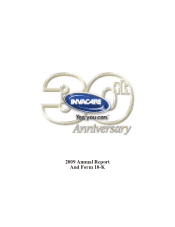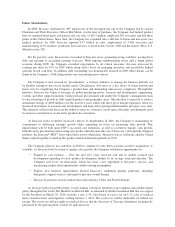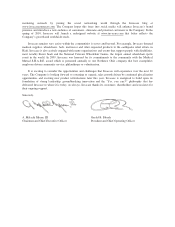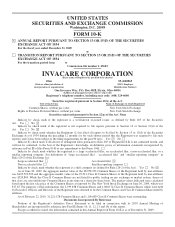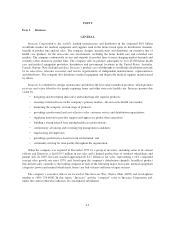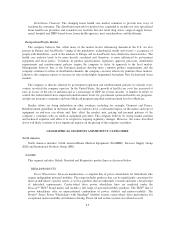Invacare 2009 Annual Report Download - page 4
Download and view the complete annual report
Please find page 4 of the 2009 Invacare annual report below. You can navigate through the pages in the report by either clicking on the pages listed below, or by using the keyword search tool below to find specific information within the annual report.
Once there is a clear understanding of what specific medical device products will be covered by the excise
tax, the Company will evaluate all of its available options to offset the impact of the tax on the Company’s
financial results in 2013, including possible price increases on the relevant products.
In addition, Invacare will continue to work with Congress and the Centers for Medicare and Medicaid
Services (CMS) to eliminate or reform national competitive bidding for home medical equipment into a
beneficiary friendly, clinically accepted and commercially viable program. In 2009, providers in nine
metropolitan areas bid on several different product categories. Winners will be announced in 2010 and the
program is scheduled to go into effect in 2011. This program does not guarantee any business for winning
providers; it only means they are allowed to continue billing Medicare for products sold.
When competitive bidding originally took effect in 2008, Invacare’s analysis of government data suggests
that as many as 80% of qualified home medical equipment and service providers (including approximately 4,200
small businesses) would have been shut out of billing Medicare for their services in the ten metropolitan areas.
When Invacare did a credit review of the winning bidders, it found that many had no meaningful credit history,
or were in collections or on credit hold with Invacare. In many cases, out-of-state winners had no local presence
where they bid and were not in a position to effectively serve beneficiaries. While CMS was instructed by
Congress to fix this program before implementing competitive bidding again, the Company is not aware of any
improvements made to the program since it started over in 2009.
For the European segment, there has been some discussion by the French government of reduced wheelchair
reimbursement for 2010, although to Invacare’s knowledge no specifics have been announced at this time. For
the Institutional Products Group both in the United States and Australia, delays in purchases by long-term care
facilities related to reimbursement uncertainty may continue, although such delays are not expected for the full
year.
Despite reimbursement pressures around the globe, the Company still believes that homecare is the
“trifecta” of healthcare, because it is patient preferred, results in better outcomes and is more cost-effective than
institutional care (homecare is one-fifth the cost of institutionalized care(a)). Invacare will continue to be an active
participant in the conversation on healthcare reform, working on behalf of the industry to drive home that
message.
As Invacare looks towards the future, it does so with the strongest management team ever assembled at the
Company. In September 2009, Patricia Stumpp was promoted to the position of Senior Vice President – Human
Resources. She is responsible for leading all aspects of global human resources, including associate relations,
compensation, benefits, associate training, development and safety. Patricia joined Invacare in 1991 and has
served in multiple positions within the human resources department giving her a great perspective on the
Company.
On March 1, 2010, Invacare welcomed former United States Senator Charles S. Robb as a new independent
director to serve on Invacare’s Board of Directors. Senator Robb will bring significant new perspectives to the
Board along with substantial experience in governmental and international affairs. With healthcare being one of
the most important issues in the United States today, the Company is fortunate to add Senator Robb’s extensive
governmental affairs experience and insights to the Board. Additionally, as Invacare looks to maximize the
advantages of its global footprint and enters new markets such as China and Latin America, Senator Robb’s
international perspective will be extremely beneficial.
This is an exciting time for Invacare. Moving strictly from the tactical cost reductions of late to the strategic
initiative of glocalization, the Company is ripe with opportunities to reduce cost and gain market share while
further strengthening the number one home healthcare brand in the world. Invacare recently expanded its
(a) Doty, Pamela. “Cost-Effectiveness of Home and Community-Based Long-Term Care Services.” USHHS/
ASPE Office of Disability, Aging and Long-Term Care Policy. June 2000: 10.

